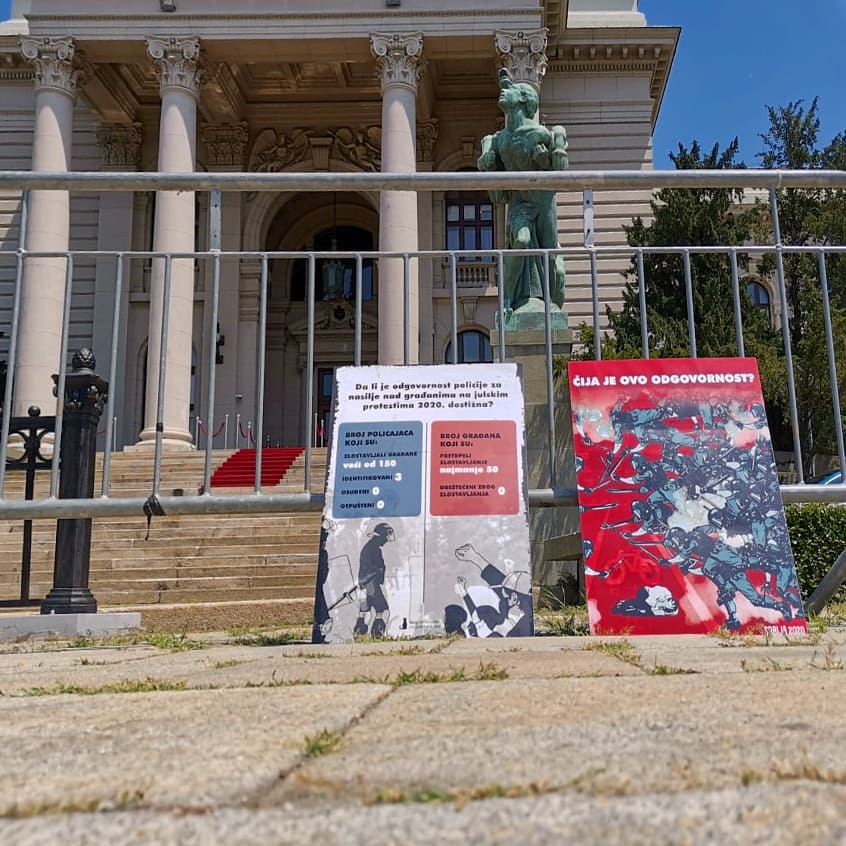 The Belgrade Centre for Human Rights (BCHR) marked the first anniversary of the civic protests in Serbia, during which a large number of citizens were victims of police brutality, both in the streets and in police stations, by presenting its report Investigations of Police Brutality during the July 2020 Civic Protests. The report focuses on the course of the ongoing investigations against police officers by the public prosecution offices and the Protector of Citizens.
The Belgrade Centre for Human Rights (BCHR) marked the first anniversary of the civic protests in Serbia, during which a large number of citizens were victims of police brutality, both in the streets and in police stations, by presenting its report Investigations of Police Brutality during the July 2020 Civic Protests. The report focuses on the course of the ongoing investigations against police officers by the public prosecution offices and the Protector of Citizens.
The BCHR filed 32 criminal reports against over 70 unidentified police officers and as many initiatives and complaints with the Protector of Citizens, requiring that he review the lawfulness of the MIA’s operations. A11 – Initiative for Economic and Social Rights filed another nine criminal reports of police brutality in Belgrade and five initiatives seeking the review of the MIA’s operations by the Protector of Citizens.
The report identifies a number of flaws in the handling of the criminal reports, complaints and initiatives by the relevant authorities, greatly undermining the likelihood of the identification and punishment of those responsible. The effectiveness of the investigations into police brutality is questionable given the lack of activity on the part of the Belgrade First Public Prosecution Office, and lack of thoroughness and promptness of the MIA’s Internal Control Sector (ICS) and the Protector of Citizens, wherefore the victims of police brutality will probably be forced to seek justice before the Constitutional Court and international human rights institutions.
Herewith some of the major flaws identified in the report:
- Forwarding of criminal reports and evidence of ill-treatment (witness statements, medical documentation, video footage, proposed evidence, etc.) to the police units where the implicated officers work before taking any action in response to the criminal reports (questioning of the suspects, collection of evidence) – facilitating collusion of the suspect police officers and their co-workers;
- Written communication between the Belgrade First PPO and the ICS during the investigations via the Belgrade police – compromising the confidentiality of the investigations;
- Written communication between the Protector of Citizens and the ICS during the investigations via the Police Minister’s Office and the MIA Secretariat – compromising the confidentiality of the proceedings before the Ombudsman;
- Delays in taking statements from police officers – more than two months after the incidents;
- Delays in taking statements from victims – more than seven months after the incidents – some victims have not even been summoned yet;
- Failure to order court expert reports on the injuries and medical documentation;
- Delays in collecting the video footage of cameras that may have recorded police brutality and failure to check MIA claims that some of its surveillance cameras on Belgrade streets were not operational;
- Failure to organise identification parades in cases where the victims said they might be able to recognise the officers who had ill-treated them, who were not wearing visors or masks during the incidents;
- Failure to penalise police officers who obviously made false statements during the preliminary investigation proceedings and produced identical (copy-paste) reports on use of force;
- Failure to take statements from all officers involved in the incidents and to question their superiors’ assessments that their use of force had been legal.
The report is available here in english, as well here in serbian.
The development and publication of this report has been supported by the European Center for Non-Profit Law (ECNL) within the project “Legal Support to Victims of Police Brutality during the July 2020 Protests and Analysis of Judicial and Prosecutorial Practices in Torture and Ill-Treatment Cases in the January 2018-June 2020 Period”.
The report is part of BCHR’s publication on investigations of torture and ill-treatment in the 2018-2020 period, which will be published in the coming weeks.







